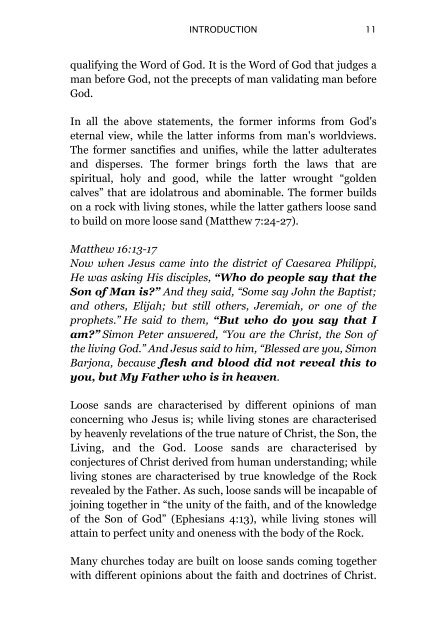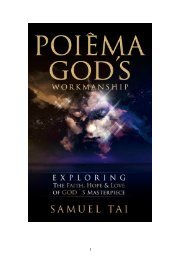'Poiema, God's Workmanship' by Samuel Tai - Preview
'Poiēma' means 'workmanship'; it speaks of the mastery of the Master on His masterpiece; it also speaks of God's eternal workmanship on His elect from eternity before Genesis to eternity after Revelation. 'Poiēma, God's Workmanship' presents a biblical vision of God's divine masterplan which He carried out in Christ Jesus. It traces the ancient pathways of God through the ages, from Eden to the new heaven and new earth. It studies the image of Christ that God had authored, and will make perfect, in His elect from the day of creation until the day of Christ Jesus. It brings the transcendent nature of God and His Spirit of truth to bear on His Church and His Kingdom for the summing up of all things in Christ. 'Poiēma, God's Workmanship' is systematic theology made easy. Not only will it bind us together in the unity of the faith and of the knowledge of the Son of God, it will also be the anchor of our soul, preventing us from being tossed here and there by waves of false teachings, or being carried about by every wind of deceptive doctrine. Let us swim into deeper depths, and soar onto higher heights, by the Spirit of truth. Let us be the 'poiema' of God! 'Poiēma, God's Workmanship' is available in both paperback and e-book formats.
'Poiēma' means 'workmanship'; it speaks of the mastery of the Master on His masterpiece; it also speaks of God's eternal workmanship on His elect from eternity before Genesis to eternity after Revelation.
'Poiēma, God's Workmanship' presents a biblical vision of God's divine masterplan which He carried out in Christ Jesus. It traces the ancient pathways of God through the ages, from Eden to the new heaven and new earth. It studies the image of Christ that God had authored, and will make perfect, in His elect from the day of creation until the day of Christ Jesus. It brings the transcendent nature of God and His Spirit of truth to bear on His Church and His Kingdom for the summing up of all things in Christ.
'Poiēma, God's Workmanship' is systematic theology made easy. Not only will it bind us together in the unity of the faith and of the knowledge of the Son of God, it will also be the anchor of our soul, preventing us from being tossed here and there by waves of false teachings, or being carried about by every wind of deceptive doctrine.
Let us swim into deeper depths, and soar onto higher heights, by the Spirit of truth. Let us be the 'poiema' of God!
'Poiēma, God's Workmanship' is available in both paperback and e-book formats.
Create successful ePaper yourself
Turn your PDF publications into a flip-book with our unique Google optimized e-Paper software.
INTRODUCTION 11<br />
qualifying the Word of God. It is the Word of God that judges a<br />
man before God, not the precepts of man validating man before<br />
God.<br />
In all the above statements, the former informs from <strong>God's</strong><br />
eternal view, while the latter informs from man's worldviews.<br />
The former sanctifies and unifies, while the latter adulterates<br />
and disperses. The former brings forth the laws that are<br />
spiritual, holy and good, while the latter wrought “golden<br />
calves” that are idolatrous and abominable. The former builds<br />
on a rock with living stones, while the latter gathers loose sand<br />
to build on more loose sand (Matthew 7:24-27).<br />
Matthew 16:13-17<br />
Now when Jesus came into the district of Caesarea Philippi,<br />
He was asking His disciples, “Who do people say that the<br />
Son of Man is?” And they said, “Some say John the Baptist;<br />
and others, Elijah; but still others, Jeremiah, or one of the<br />
prophets.” He said to them, “But who do you say that I<br />
am?” Simon Peter answered, “You are the Christ, the Son of<br />
the living God.” And Jesus said to him, “Blessed are you, Simon<br />
Barjona, because flesh and blood did not reveal this to<br />
you, but My Father who is in heaven.<br />
Loose sands are characterised <strong>by</strong> different opinions of man<br />
concerning who Jesus is; while living stones are characterised<br />
<strong>by</strong> heavenly revelations of the true nature of Christ, the Son, the<br />
Living, and the God. Loose sands are characterised <strong>by</strong><br />
conjectures of Christ derived from human understanding; while<br />
living stones are characterised <strong>by</strong> true knowledge of the Rock<br />
revealed <strong>by</strong> the Father. As such, loose sands will be incapable of<br />
joining together in “the unity of the faith, and of the knowledge<br />
of the Son of God” (Ephesians 4:13), while living stones will<br />
attain to perfect unity and oneness with the body of the Rock.<br />
Many churches today are built on loose sands coming together<br />
with different opinions about the faith and doctrines of Christ.



